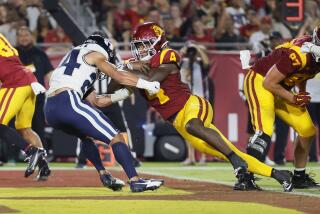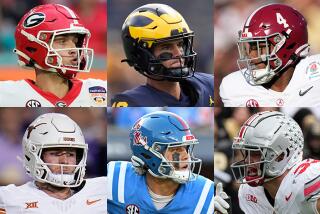They’ve Won 30 in Row, but Nothing Is a Breeze
- Share via
Miami last suffered a football loss in September 2000, is defending national champion and ranks No. 1 this week in pass defense.
Larry Coker has yet to lose a game as head coach -- the guy has had almost two years to polish his first, post-loss locker room speech -- while Hurricane quarterback Ken Dorsey is a leading contender for the Heisman Trophy.
In other words, someone call 911.
Forget that Miami’s 30-game winning streak leaves the program only 17 short of Oklahoma’s major college record of 47, an astounding achievement in the era of scholarship limits.
The sense is that Miami is on the ropes, one sucker punch from losing its title belt, Larry Holmes on last legs.
Miami plays at Tennessee on Saturday in what amounts to another program-defining moment. The Hurricanes already have fallen in the polls and somewhat out of favor. Last week’s 25-point road victory at Rutgers didn’t impress Associated Press voters, who dropped the Hurricanes to No. 2 in their poll, setting off a chain reaction that left the Hurricanes at No. 3 in the bowl championship series rankings and, at least temporarily, out of the national title game.
In most sports, the champion is the champion until taken down, but that’s not the way it works under college football’s Dewey Decimal Points System.
Miami’s panic impulses have been felt and recorded by an array of gadgetry; it’s almost as if the Hurricanes have been hooked up to a BCS lie-detector test -- and failed.
Truth is, there is something wrong with the Hurricanes. They’ve had to come from behind to win their last three games, and while you used to think Miami tended to turn its talent off and on like a faucet, no title contender in its right mind spots Rutgers a 17-14 fourth-quarter lead without paying a political price.
Coker says his team is starting to remind him of the 1998 UCLA Bruins, meaning Coker must be into his 15th bottle of Pepto-Bismol.
“If they beat us they play for the national championship,” Coker said of the team’s Dec. 5 matchup that year.
“They’d won several games all year long by outscoring their opponent.”
(Note: Coker knows his history: UCLA kept its unbeaten season alive with harrowing victories against Oregon, Stanford and Oregon State.)
UCLA was 10-0 entering the Miami game.
“That day,” Coker continued, “we outscored them, 49-45, and cost them an opportunity to play for the national title.
“You just can’t continually live on the edge.”
Miami, like UCLA in ‘98, has been playing with 10 toes over the ledge:
* Oct. 12: The Hurricanes needed two fourth-quarter touchdowns to take the lead on Florida State, 28-27, then held on as Seminole kicker Xavier Beitia missed a 43-yard field-goal attempt as time expired.
* Oct. 26. Miami and West Virginia were tied at 17-17 in the third quarter before the Hurricanes prevailed, 40-23. Miami rushed for a season-low 102 yards and gave up a season-high 363.
* Nov. 2. Miami trailed Rutgers, No. 145 in this week’s Sagarin ratings, before a fourth-quarter blitz produced a 42-17 victory that raised eyebrows, not confidence.
“You look at the score and it’s a 25-point win on the road,” Coker said.
“Everything is fine, but it’s not fine. We have things we have to get corrected. The thing we can’t do is accept just a win.”
Miami had 13 penalties in the game, nine on special teams. The Hurricanes lead the Big East in mistakes, averaging 87 penalty yards a game.
While the defensive secondary has been superb, Miami ranks only 77th nationally in rush defense -- Miami of Ohio is No. 50 -- and has committed as many turnovers, 17, as it has forced.
With remaining games against Tennessee, Pittsburgh and Virginia Tech, Coker knows his team can’t keep living like this.
Said Coker: “Hopefully we’re intelligent players and coaches, we see that and understand it.”
Big Ten Mess
“I don’t know” was the wrong answer.
Michigan State Coach Bobby Williams spoke those words Saturday when asked if he had lost control of his team and Athletic Director Ron Mason used the comments as grounds for firing Williams on Monday.
Mason correctly read “I don’t know” as meaning “yes I have” and mercifully put to an end a situation that was getting uglier by the minute.
Michigan State opened the season at No. 18 in the preseason polls and climbed as high as No. 15 after a 2-0 start, but it has been an Irwin Allen movie ever since, one disaster heaped on another.
The Williams era came to a crashing conclusion after last weekend’s 49-3 loss to Michigan, which dropped Michigan State’s record to 3-6. It was learned afterward that starting quarterback Jeff Smoker, benched for an undisclosed reason, had checked into a rehab center for a substance abuse problem.
The next morning, Mason received a phone call with news that Dawan Moss, the team’s starting tailback, had been arrested after an alleged drunken altercation with police.
Smoker and Moss were team captains.
With sordid innuendo sweeping Internet chat rooms, Mason had no recourse but to fire the coach.
Would Williams have survived had the Spartans had a better record?
The short answer: you bet.
When things are going great guns -- on the field, not in the dormitory -- nothing short of manslaughter stops a parade toward a major bowl.
Michigan State offensive coordinator Morris Watts, the 64-year-old lifetime assistant who will take over for Williams on an interim basis, said problems tend to evaporate when you win.
“I wouldn’t go as far to say that they’re swept under the table or anything like that,” Watts said. “But sometimes the fact that things are going great is more important than that little side note that just happened.”
Williams couldn’t survive the double-whammy of poor play and internal combustion.
The Michigan State mess is only the latest in a series of Big Ten missteps. Here’s the quick roundup: A Michigan player was shot in the off-season, the officiating has been odorous to the point Penn State Coach Joe Paterno insinuated bias because one referee lived in Ann Arbor, Mich. More recently, Purdue quarterback Brandon Kirsch broke his hand throwing a punch at a fraternity party.
Over the weekend, Wisconsin tailback Anthony Davis suffered a stab wound to the thigh in a domestic dispute and you could start a reality television show chronicling a season with the Michigan State Spartans.
A Numbers Game
Bobby Williams, of course, wasn’t just a coach, he was one of only four African American coaches in Division I-A football. Floyd Keith, executive director of the Black Coaches Assn., has devoted much time and energy into increasing the number of minority coaches in the game, so Williams’ firing was a blow.
Given the situation, however, the BCA couldn’t cry foul.
“I would much rather have Bobby in place,” Keith said in a phone interview this week. “But no one is naive here. We all understand that coaching itself has its own hazards, irrespective of a lot of circumstances. There are a lot of things that occur that you can’t control.
“You weigh it and you measure it. If something would have been expressed to me that this was not a fair decision, or completely abstract, then maybe our association would have some comments. I’ve talked with Bobby, talked with Michigan State. It’s unfortunate. I know this was not easy for either party.”
Keith’s only hope is that Michigan State will consider another minority as Williams’ replacement.
Watts, the interim coach, is white but not seeking the full-time position.
With Williams ousted, the remaining major college black coaches are Fitz Hill of San Jose State, New Mexico State’s Tony Samuel and Tyrone Willingham of Notre Dame.
Hurry-Up Offense
Remember the outrage last year when Nebraska advanced to the national title game without winning its division in the Big 12 Conference?
It could happen again. Texas is No. 4 in this week’s BCS rankings and may need only two of the three schools ahead of it to lose to make it to the Fiesta Bowl.
The Longhorns can by finishing 11-1 and advance to Tempe despite finishing second in the Big 12’s South Division to Oklahoma, which beat Texas on Oct. 12. There was talk in the off-season about amending BCS language to require that title-game participants had won their conference titles, but the major conference commissioners decided against it.
Texas is glad they did. Pacific 10 Conference Commissioner Tom Hansen said this week it was unfair to exclude a school from BCS consideration just because it didn’t win its conference title. The problem is two conferences, the Big 12 and Southeastern, have championship games.
“For what we’re doing here with the BCS, you need to look at the 11- and 12-game schedule, not just the conference schedule,” Hansen said. “To decide who is No. 1 and No. 2, which is all we’re doing, let’s let everyone stand on their record.”
Oklahoma has a commanding 3.53-point lead over Ohio State in this week’s BCS rankings so it’s conceivable the Sooners could lose the Big 12 title game and still finish No. 2 and play for the national title. Wouldn’t that be a hoot?
We’ll find out Saturday if it’s really 1993 all over again. That year, Notre Dame’s national title hopes were dashed with a loss to Boston College a week after the Irish upset Florida State.
Last weekend, Notre Dame lost to Boston College a week after it beat Florida State. In 1993, after beating Notre Dame, Boston College followed with a loss to West Virginia. Boston College plays at West Virginia on Saturday.
Nutty note of the week: Miami plays at Tennessee in a game with national implications. Rutgers (1-8) led both schools at the half before losing.
More to Read
Go beyond the scoreboard
Get the latest on L.A.'s teams in the daily Sports Report newsletter.
You may occasionally receive promotional content from the Los Angeles Times.











